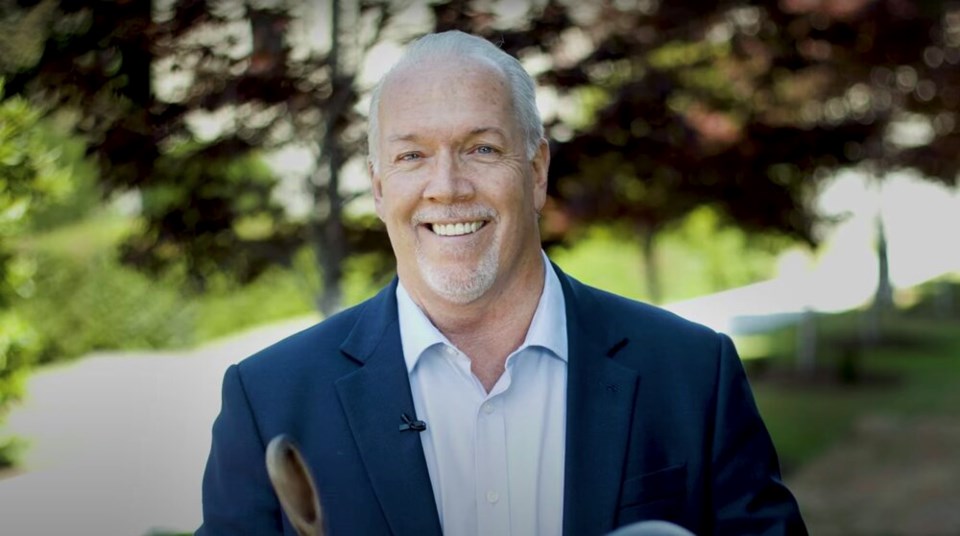It should surprise no one that the province’s B.C. NDP government, its premier and its minister responsible for the freedom of information law would win an award last week.
The Canadian Association of Journalists bestows only one such recognition annually. By tradition it has taken hard work, discipline and persistence necessary for the accolade.
But there it was: the Code of Silence award in the Outstanding Achievement in Government Secrecy category, awarded to those who best exemplify dedication to deny transparency, openness and the public’s right to know.
Well-earned, we can agree. The honour is theirs to savour for a mission accomplished.
A couple of days later, the minister who oversees the provincial Freedom of Information Act, Lisa Beare, came in for a second round of attention in the legislature. Beare was, might we say, exposed for telling MLAs she was still deliberating on an issue upon which she had days earlier decided: the new fees to apply for records. Short memory on her part, seemingly. And in parliamentary parlance, it’s called misleading the House, and it is a spot of trouble.
You have a public right to know much, much more than governments disclose and permit. There are laws at federal, provincial and municipal levels specifically to serve this right. Problem is, there are substantial bureaucratic mechanisms – and resources – to thwart the right and to shield information from public view.
Beare and John Horgan are in a large club that cuts across party lines and undermines the spirit and often the letter of the law to provide the public access to government records on how decisions are made, how policies are shaped, how programs are operated and how money is spent.
There are, logically, many errors and embarrassments amid the activities and decisions of any government. They, like we all, make mistakes. That is why pencils have erasers.
Nobody loves embarrassment, but governments have the unique opportunity to use our tax dollars to ensure discomforts are kept to a minimum. They do this by narrowing the scope of which records can be disclosed, by creating impediments (like the new B.C. $10 application fee) and by a vast armada to stickhandle information and communicate the most positive messages possible.
The misery of freedom of information is part of a larger environment in which journalism finds itself increasingly weakened in efforts to serve as public surrogates in seeking accountability. The public has a point in complaining that journalists do not adequately extract truth from power, but principally it has to do with the enormous investment by governments, institutions and businesses in controlling the flow of information.
The public has far less of a point to claim that media generally should not be trusted, because the sizable responsible media certainly can be. And it has no right to think that media ought to be harassed and hurt in their lines of work.
A large factor in this tug-of-war on accountability is how governments, businesses and institutions spend significantly – maddeningly, often employing ex-journalists – to stage the release of information to fill the daily demands of the craft for its newscasts, websites and publications.
This daily menu of self-serving announcements is often sufficient to occupy the time of journalists and provide a version of truth that, by extension, satisfies and keeps them from digging deeper. This acceptance of a substitute for a fuller story is a media fault.
Access has changed remarkably in the last decade. It is typical today for journalists to have access only to emailed, edited and kerned government statements on issues they are pursuing. There is little or no spontaneity in these exchanges. It is typical for governments, institutions and businesses to require journalists to provide their questions in advance of an interview. It is also typical for those interview subjects to request a review of their quotes and even of stories before they are published. This has distorted the process of inquiry to the point of inauthenticity.
The days of phoning a government official – even, dare say, showing up in that person’s office – and conducting an accountability interview are over. Journalists are routinely rerouted to communications officials and away from the expertise inside a bureaucracy, for fear the message will not match the talking points an administration wishes the public to receive. When officials appear at news conferences, they are heavily briefed and rehearsed with specific wording to answer anticipated questions, and usually with documentation to remind them of their lines at the podium.
What results is a sanitized, clinical version of society’s decision-making in the public and private sectors. Which is why a law like the Freedom of Information Act matters, because it can provide insight into how policies are built and implemented without the filter of public relations.
Yes, even the law doesn’t capture the full thinking. Public servants often use personal email to avoid the reach of the law or hold oral briefings on issues with no notetaking to avert disclosure.
But when the weak law is further diluted, when impediments are erected to its effectiveness, and when governments dismiss these concerns as Beare and Horgan did in recent months, we have a serious problem on our hands that should concern more than journalists.
(A post-script: I have a recording of the new B.C. Liberal leader Kevin Falcon from his leadership campaign promising to fix the law to bring about transparency. If he becomes premier, I invite him to follow through. You will forgive me if I remain skeptical.)
Kirk LaPointe is publisher and editor-in-chief of BIV and vice-president, editorial, of Glacier Media.


